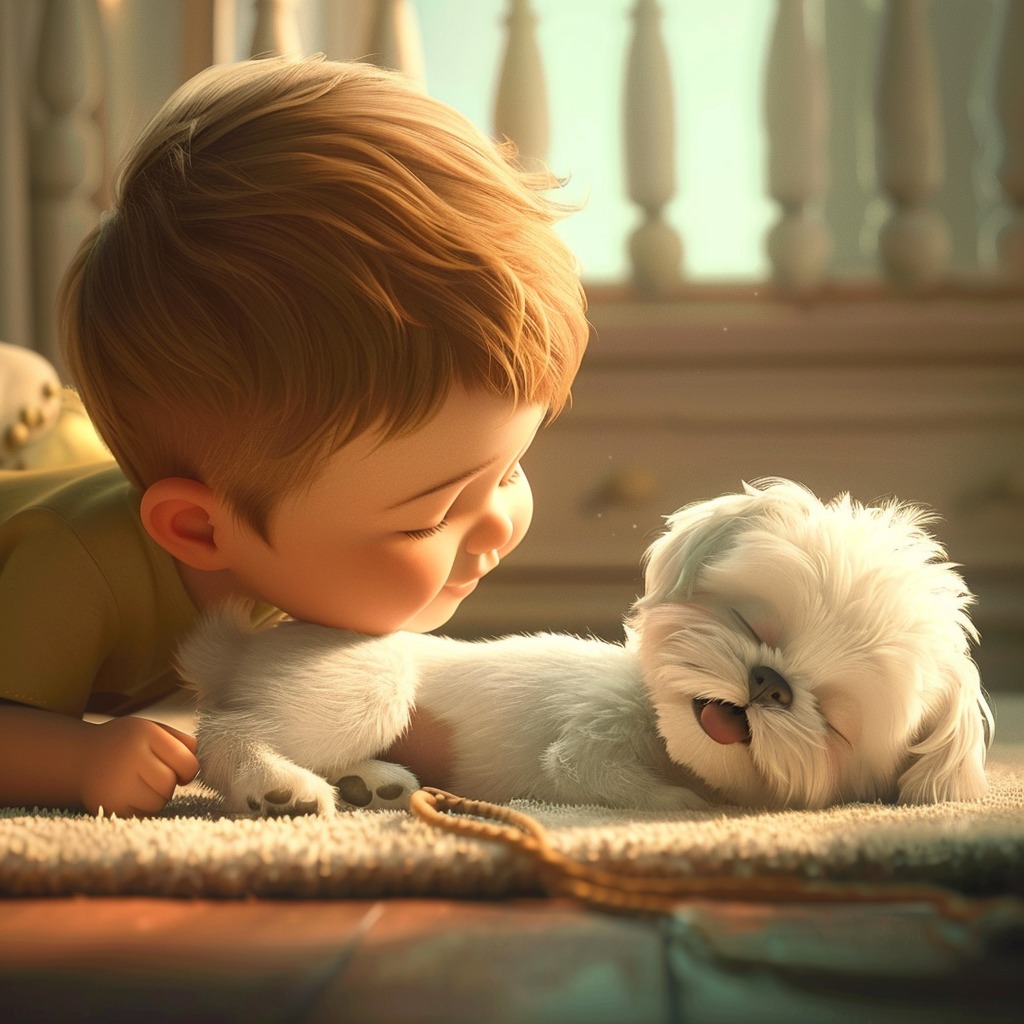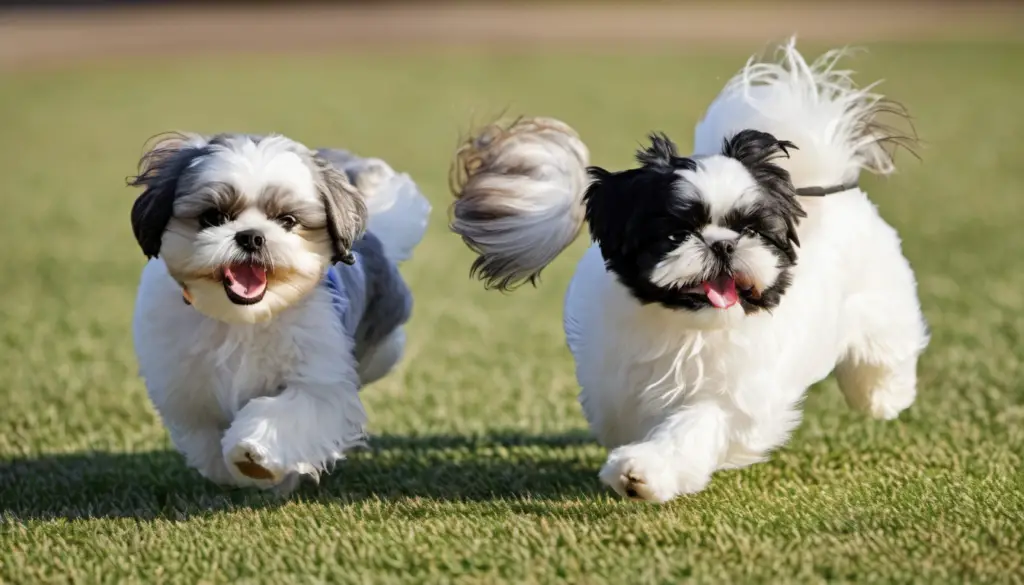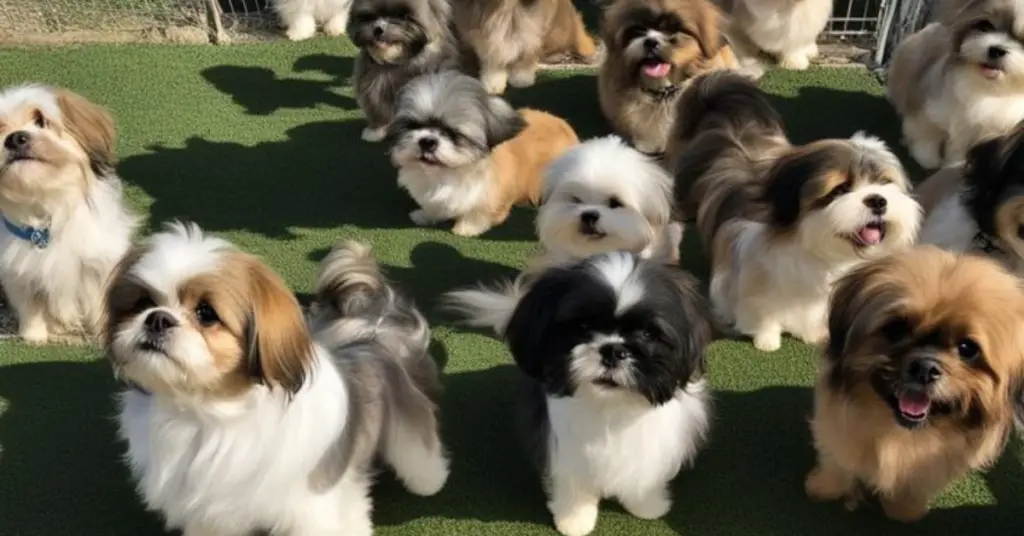
Socialization is crucial for Shih Tzus to develop into well-rounded, confident, and happy dogs. Introducing your Shih Tzu to new pets and people can be a rewarding experience, fostering positive relationships and preventing behavioral issues. This comprehensive guide will cover essential tips and strategies for successful socialization.
Understanding the Importance of Socialization
Socialization is the process of exposing your Shih Tzu to various people, animals, environments, and experiences to help them become well-adjusted adults. It is particularly important during the first few months of a puppy’s life but remains essential throughout their lives. Socialization helps reduce fear and anxiety, promoting a confident and friendly demeanor.
Poorly socialized dogs can develop behavioral problems, such as aggression, fearfulness, and anxiety. These issues can lead to stress for both the dog and the owner. Proper socialization can prevent these problems and make your Shih Tzu a more enjoyable companion.

A well-socialized Shih Tzu is more adaptable and comfortable in different situations. They are likely to handle new experiences, such as vet visits, grooming appointments, and social gatherings, with ease.
Socialization also enhances your Shih Tzu’s mental stimulation, preventing boredom and promoting overall well-being. Engaging with different environments and beings keeps their minds active and healthy.
Starting Early: Socializing Puppies
The socialization window for puppies is typically between 3 and 14 weeks of age. During this period, puppies are more open to new experiences and less likely to develop fear responses. Starting socialization early sets a strong foundation for your Shih Tzu’s future behavior.
Begin by exposing your Shih Tzu puppy to a variety of people, including men, women, and children. This helps them become comfortable with different types of individuals.

Introduce your puppy to various environments, such as parks, busy streets, and different types of homes. Gradual exposure to different settings reduces the likelihood of fear and anxiety in new places.
Allow your puppy to interact with other friendly dogs. Puppy playdates or puppy socialization classes can provide controlled environments for positive interactions.
Ensure that all interactions are positive and rewarding. Use treats, praise, and play to reinforce good behavior and create positive associations with new experiences.
Monitor your puppy’s body language and reactions. If they show signs of fear or stress, such as trembling or cowering, remove them from the situation and try again later at a slower pace.Consistency is key. Regularly expose your puppy to new experiences to reinforce positive behaviors and prevent regression.

Consult with your veterinarian about your puppy’s vaccination schedule. Ensure they are protected against common diseases before exposing them to new environments and animals.
Gradual Introduction to New Pets
Introducing your Shih Tzu to new pets requires patience and careful planning. A gradual approach helps prevent stress and promotes positive relationships between pets.
Start by keeping the new pet and your Shih Tzu in separate rooms. Allow them to become familiar with each other’s scent by swapping bedding or toys between them. Use a baby gate or a crate to allow the pets to see and smell each other without direct contact. This helps them become accustomed to each other in a controlled manner.

Gradually increase the amount of time they spend near each other, always supervising their interactions. Reward both pets for calm and positive behavior with treats and praise.
If introducing a new dog, consider taking them for a walk together. Walking side by side can help establish a positive relationship and reduce tension. Ensure that each pet has their own space, such as separate beds and feeding areas. This prevents competition and territorial behavior.
Monitor their body language closely. Signs of aggression or fear, such as growling, hissing, or raised fur, indicate that you need to slow down the introduction process. Be patient and allow the pets to set the pace. Rushing the introduction can lead to negative experiences and hinder their ability to get along.
Introducing Your Shih Tzu to Cats

Introducing a Shih Tzu to a cat requires careful management, as their interactions can vary depending on their individual personalities. A controlled and gradual approach ensures a smooth transition. Begin by keeping the cat and your Shih Tzu in separate areas of the house. Allow them to become familiar with each other’s scent by swapping bedding or using a towel to rub each animal and then placing it in the other’s space.
Use a baby gate or a crate to allow them to see and smell each other without direct contact. This helps them become accustomed to each other in a controlled environment. Gradually increase their exposure to each other by allowing supervised interactions. Keep the dog on a leash initially to prevent any sudden movements that might startle the cat.
Provide high perches or safe spaces for the cat to retreat to if they feel threatened. Cats often feel more secure when they can observe from a higher vantage point.

Reward both the cat and your Shih Tzu for calm behavior during interactions. Use treats, praise, and play to create positive associations with each other’s presence. Monitor their body language closely. Signs of stress, such as hissing, growling, or raised fur in the cat, or intense staring and barking in the dog, indicate that you need to slow down the introduction process.
Be patient and allow the cat and dog to set the pace. Some cats and dogs may take longer to become comfortable with each other, so it’s important not to rush the process.
Introducing Your Shih Tzu to Small Pets
Small pets, such as rabbits, guinea pigs, and birds, require special consideration when introducing them to your Shih Tzu. Their small size and different behaviors can be intriguing and potentially stressful for your dog.

Keep small pets in secure enclosures during initial introductions. Allow your Shih Tzu to observe them from a distance, gradually decreasing the space between them. Supervise all interactions closely. Never leave your Shih Tzu alone with small pets, as their natural prey drive might kick in.
Use positive reinforcement to reward calm behavior. Treats, praise, and gentle petting can help create positive associations with the presence of small pets. Allow the small pet to explore while your Shih Tzu is on a leash or behind a baby gate. This gives the small pet a sense of security while allowing your dog to become accustomed to their movements.
Provide plenty of mental and physical stimulation for your Shih Tzu. Boredom can lead to increased interest in small pets, so keep your dog engaged with toys, training, and exercise. Monitor body language for signs of stress or overstimulation. If your Shih Tzu becomes overly fixated or excited, redirect their attention with a toy or treat.

Be patient and consistent. It may take time for your Shih Tzu to learn to coexist peacefully with small pets, but with careful management, it is possible.
Introducing Your Shih Tzu to New People
Meeting new people can be an exciting yet potentially stressful experience for your Shih Tzu. Proper introductions help your dog feel comfortable and confident around strangers. Start by inviting one or two calm and dog-friendly individuals to your home. Allow your Shih Tzu to approach them at their own pace.
Encourage guests to remain calm and avoid making direct eye contact initially. This can help prevent overwhelming your Shih Tzu. Use treats and praise to reward your Shih Tzu for positive interactions. Encourage guests to offer treats to create positive associations.

Allow your Shih Tzu to sniff and investigate new people without being forced. Let them take the lead in the interaction. Monitor body language for signs of stress or discomfort, such as cowering, trembling, or excessive barking. If your Shih Tzu appears stressed, provide them with a safe space to retreat to.
Gradually increase the number of new people your Shih Tzu meets. Consistent exposure helps build their confidence and social skills. Consider enrolling in a dog training class or socialization group. These provide structured environments for your Shih Tzu to practice meeting new people in a controlled setting.
Managing Shy or Fearful Behavior

Some Shih Tzus may exhibit shy or fearful behavior when meeting new pets or people. Managing these behaviors with patience and understanding is crucial for successful socialization. Create a safe space where your Shih Tzu can retreat when they feel overwhelmed. This can be a crate, a quiet room, or a designated corner.
Use positive reinforcement to reward brave behavior. Treats, praise, and gentle petting can help build your dog’s confidence. Avoid forcing interactions. Allow your Shih Tzu to approach new pets or people at their own pace. Gradually increase exposure to new experiences. Start with short, controlled interactions and gradually lengthen them as your Shih Tzu becomes more comfortable.

Consider using calming aids, such as pheromone diffusers or anxiety wraps. These products can help reduce stress and promote relaxation. Work with a professional dog trainer or behaviorist if necessary. They can provide guidance and support for managing shy or fearful behavior. Be patient and consistent. Building confidence takes time, and every small step forward is progress.
Socializing Adult Shih Tzus
Socializing an adult Shih Tzu can present unique challenges, but it is still possible with the right approach. Here are some strategies for successfully socializing an adult dog:

Start with slow introductions to new experiences and environments. Gradually increase the level of exposure as your Shih Tzu becomes more comfortable. Use positive reinforcement to reward calm behavior. Treats, praise, and play are effective tools for creating positive associations with new experiences.
Consider enrolling your adult Shih Tzu in a training class or socialization group. These structured environments provide opportunities for controlled interactions with new pets and people.
Be patient and allow your Shih Tzu to set the pace. Rushing socialization can lead to negative experiences and hinder progress. Seek professional help if necessary. A dog trainer or behaviorist can provide guidance and support for socializing adult Shih Tzus.

Maintaining Socialization Skills
Socialization is an ongoing process that requires regular reinforcement throughout your Shih Tzu’s life. Consistent exposure to new experiences helps maintain their social skills and prevent regression.
Incorporate socialization into your daily routine. Take your Shih Tzu for walks in different environments, visit dog-friendly places, and invite friends over regularly.
Continue to reward positive behavior with treats, praise, and play. Reinforcing good behavior helps maintain positive associations with new experiences.

Provide mental stimulation through training, interactive toys, and new experiences. Keeping your Shih Tzu’s mind active promotes overall well-being. Monitor for changes in behavior. If your Shih Tzu begins to show signs of fear or aggression, address the issue promptly and seek professional help if needed.
Encourage positive interactions with other pets. Arrange playdates or visits to dog parks to maintain social skills. Stay patient and consistent. Socialization is a lifelong process that requires ongoing effort and attention. Celebrate your Shih Tzu’s progress. Recognize and reward their successes, no matter how small.
Common Challenges and Solutions

Socializing your Shih Tzu may come with challenges, but with patience and the right strategies, you can overcome them. Here are some common challenges and solutions:
Fear of New Pets or People: Gradually expose your Shih Tzu to new experiences in a controlled manner. Use positive reinforcement to reward brave behavior and provide a safe space for retreat.
Aggression Towards Other Pets: Ensure gradual introductions and supervise all interactions. Consult with a professional dog trainer or behaviorist if aggression persists.
Overstimulation: Monitor your Shih Tzu’s body language and provide breaks when needed. Avoid overwhelming environments and introduce new experiences at a pace your dog is comfortable with.
Resource Guarding: Provide separate feeding and resting areas for each pet. Gradually teach your Shih Tzu to share resources using positive reinforcement and training exercises.

Regression: Consistent reinforcement of socialization skills is crucial. Regular exposure to new experiences and ongoing training helps prevent regression.
Health Concerns: Consult with your veterinarian before introducing your Shih Tzu to new pets or environments. Ensure your dog is up-to-date on vaccinations and in good health.
Lack of Confidence: Build your Shih Tzu’s confidence through positive reinforcement, training, and gradual exposure to new experiences. Celebrate small successes to boost their self-assurance.
Socialization Tips for Specific Situations
Different situations may require tailored socialization strategies. Here are some tips for specific scenarios:
Visiting the Vet: Gradually acclimate your Shih Tzu to the vet’s office by taking short trips without any procedures. Reward calm behavior and use treats to create positive associations.

Grooming Appointments: Introduce grooming tools and routines gradually. Reward your Shih Tzu for calm behavior during grooming sessions and consider professional grooming services if needed.
Traveling: Acclimate your Shih Tzu to car rides by taking short trips initially. Use a comfortable crate or seatbelt harness and reward calm behavior.
Dog Parks: Monitor your Shih Tzu’s interactions with other dogs closely. Gradually increase the time spent at dog parks and ensure positive experiences.
Family Gatherings: Introduce your Shih Tzu to family members gradually. Provide a safe space for retreat and reward calm behavior during interactions.

New Environments: Gradually expose your Shih Tzu to different environments, such as parks, busy streets, and new homes. Use positive reinforcement to reward calm behavior.
Meeting Children: Supervise interactions between your Shih Tzu and children closely. Teach children how to interact gently with your dog and reward positive behavior.
Conclusion
Socializing your Shih Tzu is a rewarding and essential aspect of their development. Introducing them to new pets and people in a controlled and positive manner helps them become well-adjusted, confident, and happy dogs. Start early with puppies and continue socialization throughout your Shih Tzu’s life. Gradual introductions, positive reinforcement, and patience are key to successful socialization.
Monitor body language and address any signs of stress or aggression promptly. Seek professional help if needed to ensure positive experiences. Celebrate your Shih Tzu’s progress and maintain their social skills through regular exposure to new experiences. With the right approach, your Shih Tzu can enjoy positive relationships with pets and people, enriching their life and yours.



